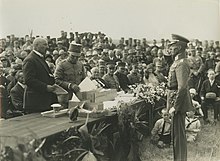Otto Ottenbacher
Otto Ernst Ottenbacher (born November 18, 1888 in Esslingen am Neckar , † January 7, 1975 in Stuttgart ) was a German lieutenant general in World War II .
Life
On June 29, 1907 he joined the Württemberg Army as a flag junior and was promoted to lieutenant on November 19, 1908 in the Infantry Regiment "Alt-Württemberg" (3rd Württembergisches) No. 121 . At the beginning of the First World War he was with his regiment in France and was promoted to first lieutenant on December 24, 1914 . In 1915 he served in Poland and Serbia and was promoted to captain on August 18, 1916 . By 1918 he came back to the Western Front and still served as an adjutant in the 51st Infantry Brigade . For his achievements during the war he was awarded both classes of the Iron Cross and the Knight's Cross of the Order of Military Merit.
After the war, Ottenbacher was transferred to Reichswehr Brigade 13 of the Provisional Reichswehr . In the Reichswehr he initially served as a company commander in the 4th (Prussian) Infantry Regiment . Major since May 1, 1929 , he was transferred to the 17th Infantry Regiment on October 1, 1931 as battalion commander. After the National Socialists came to power , he was promoted to lieutenant colonel on October 1, 1933 . On October 1, 1934, he was appointed chief of the Glogau Infantry Regiment , which was named Infantry Regiment 54 on October 15, 1935. In between he had been appointed colonel on August 1st .
At the beginning of 1938 Ottenbacher became the commandant of the East Prussian fortifications near Lötzen in East Prussia , which was renamed the Lötzen Fortress Brigade on August 16, 1939 before the war began. Previously, on April 1, 1939, he was promoted to major general and on July 1, 1940, he was appointed commander of Division No. 177 in Vienna . On October 25, 1940, he took over the leadership of the 36th Infantry Division , which was currently in motorized conversion. On March 1, 1941, he was appointed lieutenant general. Ottenbacherstrasse took off in June as part of the 4th Panzer Group on the Operation Barbarossa in part and has been the on August 13, 1941 Knight's Cross of the Iron Cross awarded. On October 6, 1941, he took over the management of the XXXXI. (mot.) Army Corps and was wounded on October 13th. After a short reserve of leaders he took over the leadership of the XIII from January 14th and April 21st, 1942 . Army Corps deployed in the central section of the Eastern Front. From August 1, 1942 to September 1944, he served as an agent general at the French military commander (MBF) and was responsible for training the security forces of the occupying power there.
In the summer of 1944, after the Allied invasion, the “Ottenbacher Group” led the “fight against gangs” in the Dordogne department and in the Massif Central . Together with Kampfgruppe Bode of the 11th Panzer Division , war crimes against civilians and several villages were destroyed during the retreat. At the beginning of September, the “Ottenbacher Group” was deployed at Langres and then at Epinal . He then took a leave of absence due to physical exhaustion.
In 1950 before the military court in Bordeaux , he denied knowledge of the MBF regulation on joint action between the Wehrmacht and the security service and was acquitted for lack of evidence.
literature
- Samuel W. Mitcham : Men of Barbarossa. Casemate Publischers, Philadelphia 2009, pp. 80-81.
- Peter Lieb: Conventional war or Nazi ideological war? Warfare and the fight against partisans in France 1943/44. Munich 2007, pp. 61, 70-72.
Web links
- For war crimes see Ottenbacher, Otto-Ernst (1888 Esslingen - 1975 Stuttgart) on gedenkorte-europa.eu, the homepage of Gedenkorte Europa 1939–1945
Individual evidence
- ↑ Otto von Moser : Die Württemberger in the world wars. 2nd expanded edition, Chr.Belser AG, Stuttgart 1928, p. 118.
| personal data | |
|---|---|
| SURNAME | Ottenbacher, Otto |
| ALTERNATIVE NAMES | Ottenbacher, Otto Ernst (full name) |
| BRIEF DESCRIPTION | German Lieutenant General in World War II |
| DATE OF BIRTH | November 18, 1888 |
| PLACE OF BIRTH | Esslingen am Neckar |
| DATE OF DEATH | 7th January 1975 |
| Place of death | Stuttgart |
